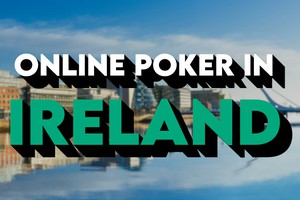Online Poker in Ireland: Legal Status, Regulation & Best Sites
Last updated: February 16, 2026
- 100% up to $600
- $100 in bonuses for new players
- Pick your bonus
- 100% cashback up to $3,000!
- FREE Tournament & Global Spins tickets
- Softest games around
- 100% up to $600
- Best selection of tournaments
- Play mixed games across all stakes
- Crypto poker site
- International liquidity
- Super soft games
 Online poker in Ireland remains fully legal in 2026, and Irish players continue to benefit from access to some of the strongest international poker platforms in the world. Unlike ring‑fenced markets that restrict participation to domestic liquidity pools, Ireland operates as an open online poker ecosystem. This structural advantage helps explain why the platforms available to Irish players are among the most competitive globally.
Online poker in Ireland remains fully legal in 2026, and Irish players continue to benefit from access to some of the strongest international poker platforms in the world. Unlike ring‑fenced markets that restrict participation to domestic liquidity pools, Ireland operates as an open online poker ecosystem. This structural advantage helps explain why the platforms available to Irish players are among the most competitive globally.
Liquidity is the defining factor when evaluating where to play. Irish players are not limited to a closed national network. Instead, they compete in shared international player pools. The result is larger tournament guarantees, deeper cash game ecosystems, more frequent high‑value series, and stronger long‑term platform sustainability.
In many smaller jurisdictions, tournament guarantees are constrained by population size. Ireland avoids that limitation entirely. Through international liquidity pools, players gain access to:
- Multi‑million prize pool online series
- Weekly Sunday majors with substantial guarantees
- Consistent mid‑stakes tournament schedules
- Reliable micro and low‑stakes cash games
- Fast‑fold formats with steady traffic
As of February 2026, Ireland’s online poker environment remains open and competitive. International operators continue to serve Irish players under recognized regulatory frameworks. While the Gambling Regulation Act 2024 is modernizing oversight structures, the core reality remains unchanged: Irish players can legally register, deposit, compete, and withdraw funds on internationally licensed platforms.
Several structural advantages distinguish the Irish market.
First, international liquidity supports viable tournament ecosystems across all buy‑in levels. Whether playing micro‑stakes events or mid‑stakes championship series, players benefit from field sizes that would not be sustainable in a segregated domestic system.
Second, competition between operators remains strong. Ireland is not restricted to a small pool of locally licensed platforms, allowing major international brands to compete directly. This competition drives innovation in software, tournament formats, promotions, and mobile performance.
Third, banking flexibility is straightforward. Most leading poker platforms support euro‑denominated accounts, widely accepted payment methods, and streamlined withdrawals. Compared to jurisdictions that require currency conversion or impose payment friction, Ireland offers a relatively smooth funding environment.
The result is a market that combines regulatory oversight with global access.
However, Ireland is also entering a period of regulatory transition.
The Gambling Regulation Act 2024 represents the most significant overhaul of gambling legislation in decades. The creation of the Gambling Regulatory Authority of Ireland introduces a centralized licensing framework and enhanced consumer protection standards. While poker‑specific implementation details remain under review, the broader shift introduces new variables into the long‑term outlook for the market.
At present, online poker remains legal and internationally integrated. Irish players continue to participate in global liquidity pools without segregation.
Understanding how regulation may evolve is essential when assessing long‑term platform stability.
This guide examines the full ecosystem rather than simply listing operators. It evaluates:
- Legal status and regulatory framework
- Liquidity structure
- Tournament depth
- Cash game traffic
- Software quality
- Mobile functionality
- Banking and withdrawals
- Tax treatment of winnings
- Long‑term sustainability
From there, the leading platforms available to Irish players are ranked based on liquidity strength, tournament guarantees, software reliability, and overall competitive positioning.
For serious players, liquidity remains the central variable. Promotional offers may create short‑term incentives, but tournament sustainability and game availability determine long‑term viability.
Recreational players may prioritize usability, manageable field sizes, and intuitive mobile design.
Ireland’s open market supports both profiles.
Because the Irish online poker environment is integrated into global networks, it is not constrained by national population size. The platforms accessible from Ireland are often the same operators that dominate international online poker markets.
In practical terms, players in Ireland can:
- Enter flagship international tournament series
- Compete in progressive knockout festivals
- Access consistent fast‑fold cash traffic
- Participate in staking marketplaces
- Use modern mobile clients with full functionality
This level of access is not typical in domestic‑only markets.
As regulatory modernization continues under the Gambling Regulation Act 2024, some structural details may evolve. As of early 2026, however, Ireland remains one of the strongest open online poker markets in Europe.
The sections that follow examine legality, regulation, liquidity, tournament ecosystems, and the leading platforms available today.
Ireland’s open ecosystem provides choice.
Selecting the right platform depends on understanding how the market is structured.
Best Poker Sites Ireland Players Can Use in 2026
Ireland’s open online poker environment allows players to access multiple international platforms. When evaluating the best poker sites Ireland players can use in 2026, several objective criteria matter:
- Global liquidity depth
- Tournament guarantees
- Cash game traffic
- Software stability and innovation
- Mobile functionality
- Banking reliability
- Long‑term platform credibility
The following five operators rank highest based on those combined factors.
GGPoker — Best Overall Poker Site in Ireland
GGPoker leads the market in 2026, supported by unmatched liquidity depth, industry‑leading tournament guarantees, and a feature‑rich software platform.
Liquidity and Tournament Depth
Liquidity is the foundation of GGPoker’s dominance. Irish players participate in a global player pool that supports some of the largest online tournament series available anywhere.
Regular offerings include:
- Multi‑million prize pool festival series
- Weekly high‑guarantee Sunday majors
- Progressive knockout championships
- Deep‑stack freezeouts
- High‑roller events
- Bounty-focused tournament series
Because liquidity is international, guarantees remain sustainable across time zones. For Irish players competing during European peak hours, tournament traffic is consistently strong.
This is particularly important for mid‑stakes players. In smaller, ring‑fenced markets, mid‑stakes tournaments often struggle with field depth. In Ireland, shared liquidity ensures sustainable buy‑ins well beyond micro levels.
Cash Game Ecosystem
Cash game traffic remains reliable across:
- Micro stakes
- Low stakes
- Mid stakes
- Select high stakes
- Fast‑fold formats
Fast‑fold variants allow players to generate higher hand volume without waiting for table reshuffles. For volume grinders, this feature is critical.
Irish players logging in during evening hours benefit from peak European traffic, ensuring quick table formation.
Software and Built‑In Tools
GGPoker’s software integrates modern player data elements directly into the client. This reflects the broader trend in online poker toward built‑in analytics tools rather than relying exclusively on third‑party HUD software.
Features include:
- Integrated staking functionality
- Built‑in performance tracking tools
- Dynamic table visuals
- Simplified bet‑sizing interface
- Multi‑table management options
For players who recognize that some online poker rooms now include built‑in HUD‑style functionality, GGPoker exemplifies this evolution.
Mobile Performance
Mobile optimization is strong. Irish players can:
- Register for tournaments
- Multi‑table cash games
- Participate in staking
- Access promotions
- Manage bankroll functions
The mobile client retains much of the desktop functionality without sacrificing stability.
Who GGPoker Is Best For
- Serious tournament grinders
- Mid‑stakes regulars
- High‑volume cash players
- Players who value liquidity above all else
GGPoker Pros & Cons
Pros
✅ Largest global liquidity pool
✅ Strongest tournament guarantees available to Irish players
✅ Innovative integrated software
✅ Built‑in analytics tools
✅ Strong mobile functionality
✅ Frequent major festival series
Cons
❌ Tougher competition due to global player pool
❌ Higher regular density at mid and high stakes
❌ Feature-rich interface may overwhelm complete beginners
Overall, GGPoker remains the benchmark platform when ranking the best poker sites available in Ireland.
WPT Global — Strong Tournament Alternative in Ireland
WPT Global secures the second position in 2026, distinguished by its tournament‑centric structure and consistent cross‑border liquidity.
Backed by the World Poker Tour brand, WPT Global has expanded aggressively in open markets. While liquidity remains below GGPoker’s scale, its positioning as a tournament-focused ecosystem makes it a strong alternative.
Tournament Structure
WPT Global emphasizes:
- Branded championship series
- Recurring mid‑stakes events
- Progressive knockout formats
- Promotional tournament festivals
- International WPT-linked events
Field sizes are generally smaller than GGPoker’s largest events, which can translate to slightly softer mid‑stakes competition.
For Irish players seeking value in moderately sized fields, this can be appealing.
Cash Games
Cash game liquidity supports:
- Micro stakes
- Low stakes
- Select mid stakes
High‑stakes depth is more limited compared to the market leader.
Software Experience
The client is streamlined and lightweight. It prioritizes usability over feature complexity.
For players who prefer a simplified interface without extensive graphical elements, WPT Global offers a clean experience.
Mobile access remains stable and tournament registration is straightforward.
Who WPT Global Is Best For
- Mid‑stakes tournament players
- Brand-driven competitors
- Players seeking alternatives to larger ecosystems
- Recreational players looking for manageable fields
WPT Global Pros & Cons
Pros
✅ Tournament-focused scheduling
✅ Recognizable international brand
✅ Cleaner, simplified software
✅ Potentially softer mid‑stakes competition
Cons
❌ Smaller overall liquidity
❌ Limited high‑stakes depth
❌ Fewer mega-series compared to GGPoker
PokerStars Ireland — Established and Reliable
PokerStars remains one of the most recognized online poker brands globally and continues to rank among the best poker sites Ireland players can use.
While its dominance has diminished relative to newer competitors, its stability remains a key selling point.
Tournament Ecosystem
PokerStars continues to offer:
- Long-running Sunday majors
- Daily structured tournaments
- Sit & Go formats
- Spin-style hyper events
- Multiple poker variants
Guarantees are solid but generally below GGPoker’s largest events.
Cash Games
PokerStars supports:
- Fast‑fold formats
- Micro to mid stakes
- Mixed game options
Software Reliability
One of PokerStars’ strongest attributes is stability. Its desktop client is widely regarded as reliable and technically consistent.
For players who prioritize infrastructure reliability over innovation experimentation, PokerStars remains a strong third choice.
Who PokerStars Is Best For
- Players who value stability
- Traditional tournament players
- Variant enthusiasts
- Recreational players comfortable with a legacy interface
PokerStars Pros & Cons
Pros
✅ Established global brand
✅ Reliable software performance
✅ Consistent tournament scheduling
✅ Wide variant selection
✅ Strong mobile stability
Cons
❌ Smaller headline guarantees than GGPoker
❌ Competitive regular presence
❌ Less aggressive innovation compared to newer platforms
Betsson Poker — Network-Based Alternative
Betsson operates within established international networks and provides Irish players access to consistent tournament and cash environments.
Tournament and Cash Overview
- Standard multi-table tournaments
- Daily low‑stakes schedules
- Micro and low cash stakes
- Network-based liquidity sharing
Liquidity is moderate but viable for recreational and semi-regular players.
Betsson Pros & Cons
Pros
✅ Accessible low‑stakes focus
✅ Integrated multi‑product ecosystem
✅ Network stability
Cons
❌ Smaller tournament guarantees
❌ Limited high‑profile festival series
❌ Reduced high‑stakes action
PartyPoker Ireland — Recreational-Focused Option
PartyPoker rounds out the top five best Ireland poker sites in 2026.
Tournament Structure
- Daily scheduled tournaments
- Modest guarantees
- Micro and low‑stakes emphasis
Cash Games
- Micro stakes
- Low stakes
- Recreational-focused tables
PartyPoker Pros & Cons
Pros
✅ Recognizable international brand
✅ Accessible buy‑in structures
✅ Simplified interface
✅ Suitable for casual players
Cons
❌ Smaller liquidity pool
❌ Limited large-scale events
❌ Fewer high‑stakes tables
Is Online Poker Legal in Ireland? A Detailed Legal Overview
Yes. Online poker is legal in Ireland.
Irish players may register, deposit, compete, and withdraw funds on internationally licensed poker platforms. There is no prohibition under Irish law against individual participation in online poker games operated by companies licensed in recognized jurisdictions.
As of February 2026, Irish residents can legally play on international poker networks that hold valid regulatory approvals in established jurisdictions such as Malta, Gibraltar, or the Isle of Man. The legal framework does not criminalize players for participating in peer‑to‑peer online poker games.
The regulatory focus in Ireland has historically been directed toward operators rather than individual users. This distinction is important. Irish law governs licensing, compliance, advertising, and consumer protections, but it does not prohibit residents from accessing internationally regulated poker platforms.
To understand the current position fully, it is necessary to examine how Irish gambling regulation is structured and how the Gambling Regulation Act 2024 reshapes oversight going forward.
Ireland’s Licensing Structure and International Operators
Unlike some European countries that operate fully ring‑fenced domestic licensing systems, Ireland historically relied on older betting legislation that did not specifically regulate modern online poker networks.
International operators serving Irish players typically hold licenses from:
- Malta Gaming Authority
- Gibraltar Regulatory Authority
- Isle of Man Gambling Supervision Commission
- Other established European regulators
These licensing bodies impose compliance requirements around:
- Anti‑money laundering procedures
- Responsible gambling tools
- Financial reporting standards
- Consumer fund protection
Irish law does not criminalize players for participating on such platforms. The focus of regulation is directed toward operators, not individual users.
This is why the best poker sites Ireland players can access are largely the same international platforms serving other global markets.
The Gambling Regulation Act 2024 — Structural Reform
The Gambling Regulation Act 2024 marks a significant modernization of Ireland’s gambling framework.
The Act establishes the Gambling Regulatory Authority of Ireland (GRAI), which will oversee licensing, compliance, and consumer protection across betting and gaming sectors.
Core objectives of the Act include:
- Creation of a centralized licensing regime
- Enhanced consumer protections
- Stricter advertising controls
- Financial transparency requirements
- Introduction of administrative enforcement mechanisms
For online poker players, the most relevant aspect of the reform involves proposed stake and win caps.
Proposed Stake Caps and Their Potential Impact on Poker
The Act has referenced proposed limits such as:
- €10 maximum stake
- €3,000 maximum win
For fixed‑odds betting and certain casino products, these caps are relatively straightforward.
Poker, however, operates differently.
Online poker is a peer‑to‑peer format. Players compete against one another rather than against the house. In tournaments, buy‑ins are pooled to create prize funds.
Applying a strict €10 stake cap to poker tournaments could theoretically limit buy‑ins above €10. That would significantly impact mid‑stakes and high‑stakes tournament ecosystems.
Industry stakeholders argue that poker should be treated differently from house‑banked casino games because:
- Outcomes are determined by player skill over time
- The operator does not assume house risk in the same manner
- Liquidity depends on international integration
As of early 2026, poker‑specific enforcement guidance has not imposed restrictive buy‑in caps on international operators serving Irish players.
Irish players continue to access full tournament schedules and cash game stakes across the best poker sites Ireland supports.
Will Ireland Become a Ring‑Fenced Poker Market?
One of the most common concerns among serious players is whether Ireland will transition toward a ring‑fenced poker market similar to France or certain regulated US states.
At present, there is no indication that Ireland intends to create a segregated domestic poker pool.
Ring‑fencing would significantly reduce liquidity by isolating Irish players from international competition. Given Ireland’s relatively small population compared to global poker markets, such a move would dramatically affect tournament guarantees and cash game depth.
Current regulatory signals focus on licensing oversight and consumer protections rather than player pool segregation.
As of February 2026, Ireland remains fully integrated into international liquidity networks.
Taxation of Poker Winnings in Ireland
Another critical legal consideration is taxation.
Gambling winnings are not taxed for individual players in Ireland.
This applies to:
- Online tournament winnings
- Cash game profits
- Live poker prizes
Instead of taxing players directly, Ireland applies gambling duties to operators.
For professional players and serious grinders, this tax structure represents a major advantage compared to jurisdictions where poker winnings may be classified as taxable income.
When evaluating Online Poker Ireland from a profitability standpoint, tax neutrality is a significant factor.
Responsible Gambling and Consumer Protections
Under the Gambling Regulation Act 2024, the Gambling Regulatory Authority of Ireland (GRAI) is tasked with strengthening consumer protection standards across the gambling sector, including online poker.
International operators serving Irish players already implement a range of responsible gambling measures, including:
- Deposit limits
- Session time reminders
- Self‑exclusion options
- Identity verification procedures
- Account cooling‑off tools
These mechanisms are designed to provide players with greater control over spending, session length, and overall activity.
As Ireland’s regulatory framework continues to develop, consumer protection standards are expected to become more standardized across licensed operators. This may include clearer reporting requirements, structured intervention tools, and formal oversight of advertising practices.
Platforms licensed by recognized regulatory authorities operate under established compliance frameworks. These typically require:
- Anti‑money laundering controls
- Customer due diligence procedures
- Secure payment processing
- Complaint resolution systems
For players, the practical implication is that reputable online poker platforms maintain structured safeguards consistent with international regulatory standards.
While regulation is evolving, the core protections available to Irish players already align with broader European compliance norms.
Legal Outlook for 2026 and Beyond
As of February 2026:
- Online poker remains legal in Ireland
- Irish players may access international platforms
- No ring‑fencing has been implemented
- No strict poker‑specific stake caps have been enforced
- Gambling winnings remain untaxed
The long‑term outlook will depend on how the Gambling Regulation Act 2024 is implemented in practice.
Possible regulatory pathways include:
- Clarified carve‑outs recognizing poker’s peer‑to‑peer structure
- Moderate buy‑in adjustments
- Stronger licensing oversight without liquidity segregation
At present the best poker sites in Ireland that players can access remain fully operational and integrated into global poker ecosystems.
Understanding this legal framework is essential before choosing a platform. Regulation affects long‑term stability, liquidity sustainability, and consumer protections.
The next section evaluates the best poker sites Ireland players can use in 2026 based on liquidity, tournament depth, software performance, and market positioning.
Online Poker Tournaments in Ireland
Tournament access is one of the defining strengths of the Irish online poker market. Because Ireland is not a ring‑fenced jurisdiction, players participate in international tournament ecosystems rather than a closed domestic schedule.
This distinction has a direct impact on tournament viability.
In segregated markets with smaller populations, mid‑stakes tournaments often struggle to sustain meaningful guarantees. Field sizes are limited by domestic participation, which can compress prize pools and reduce scheduling depth. Ireland does not face this constraint.
Through shared international liquidity, tournaments available to Irish players benefit from:
- Competitive guarantees across a wide range of buy‑in levels
- Sustainable mid‑stakes scheduling
- High‑stakes events with substantial field depth
- Micro‑stakes tournaments that consistently attract large participation pools
This structural advantage supports a tournament environment that more closely resembles major global markets than small domestic ecosystems.
As of 2026, Ireland’s integration into international networks remains the single most important factor shaping tournament depth and long‑term sustainability.
Daily Tournament Schedules
Across the best poker sites in Ireland that players can access, daily schedules typically include:
- Micro buy‑in tournaments
- Low‑stakes freezeouts
- Progressive knockout events
- Re‑entry formats
- Turbo and hyper‑turbo events
- Deep‑stack structures
Micro and low‑stakes tournaments remain particularly active during European evening hours. This aligns well with Irish peak traffic.
For recreational players, micro and low buy‑ins provide accessible entry points without sacrificing field size.
For more serious players, mid‑stakes daily tournaments remain viable due to global participation pools.
Weekly Major Events
Weekly Sunday majors are a cornerstone of the Irish online tournament schedule. These events typically feature:
- Elevated guarantees
- Larger prize pools
- Deeper starting stacks
- Structured blind levels
- Extended multi‑hour play
Because Ireland participates in international liquidity pools, Sunday majors regularly reach prize levels that would be difficult to sustain in a domestic‑only market of similar size.
The scale and consistency of these weekly headline events are an important benchmark when comparing platforms. Strong guarantees signal both healthy liquidity and long‑term tournament viability.
Progressive Knockout and Bounty Formats
Progressive knockout tournaments remain extremely popular among Irish players. These formats reward aggressive play and provide partial payouts during the event rather than only at final table.
Shared liquidity strengthens these formats because larger fields increase total bounty pools.
The best poker sites in Ireland consistently schedule:
- Daily progressive knockout tournaments
- Weekly bounty championships
- Festival series built around knockout structures
These formats appeal to both recreational and regular players due to their dynamic payout structure.
Online Tournament Series and Festival Events
Major international operators regularly host large‑scale online festival series.
Irish players can participate in:
- Multi‑week championship festivals
- Branded global tournament series
- High‑roller online championships
- Satellite qualification events for live tournaments
Because Ireland is not segregated, Irish players compete for the same prize pools as international participants.
This gives Ireland Online Poker players access to events that would be impossible in a domestic-only system.
Satellite Systems and Qualification Paths
Satellite tournaments provide lower buy‑in pathways into larger events.
Across the best Ireland poker sites players can access:
- Direct satellites
- Step satellites
- Progressive ladder satellites
- Tournament ticket promotions
These qualification systems allow lower‑bankroll players to enter higher‑value events without direct buy‑in exposure.
Tournament Traffic Patterns in Ireland
Irish tournament traffic generally peaks during:
- Early evening hours
- Late evening European prime time
- Sunday afternoons and evenings
Because Ireland shares liquidity with other European regions, traffic remains stable even during off‑peak domestic hours.
For players seeking consistent multi‑table volume, liquidity depth remains the defining factor.
Cash Games in Ireland
While tournaments receive much of the attention, cash games remain a central component of the Irish online poker ecosystem.
For many players, cash formats provide a more stable and flexible alternative to multi‑table tournaments. They allow participants to control session length, manage variance more predictably, and maintain consistent volume.
Cash games offer:
- Immediate entry and exit flexibility
- Lower variance compared to tournament play
- Steady hourly volume potential
- Greater short‑term bankroll stability
Because Ireland participates in international liquidity pools, cash tables across micro, low, and mid stakes remain consistently active during European peak hours. This depth is particularly important for regular players seeking stable table availability rather than event‑based scheduling.
When comparing platforms, cash traffic, rake structure, and table selection are just as important as headline tournament guarantees.
Available Stakes
Across major international platforms serving Ireland, cash games typically span:
- Micro stakes
- Low stakes
- Mid stakes
- Select high stakes
Micro and low stakes consistently fill during European evening hours.
Mid stakes remain viable due to international liquidity.
High‑stakes depth varies by platform, with larger global operators supporting more consistent high‑level action.
Fast‑Fold Formats
Fast‑fold poker formats allow players to instantly move to a new table after folding, increasing hands per hour.
These formats are widely available on the best poker sites in Ireland.
Benefits include:
- Higher hand volume
- Reduced waiting time
- Efficient multi‑table play
- Streamlined grind sessions
For volume-focused players, fast‑fold formats are often a key decision factor.
Player Pool Composition
Because Ireland participates in international liquidity pools, player pools include:
- Recreational players
- Semi‑regular players
- Professional grinders
- International participants across multiple regions
Competition levels vary by stake.
Lower stakes generally contain higher recreational density.
Mid and high stakes attract more experienced players.
Selecting the right platform can influence player pool composition significantly.
Rake and Structure Considerations
Rake structures vary between operators. Serious cash players should evaluate:
- Rake percentages
- Rake caps
- Loyalty or cashback systems
- Promotional leaderboards
While liquidity is the most important factor, rake efficiency plays a role in long‑term profitability.
Table Availability and Multi‑Tabling
The best poker sites Ireland players use allow:
- Multi‑table play
- Customizable table layouts
- Desktop and mobile synchronization
Platforms with stronger liquidity allow more simultaneous table options at preferred stakes.
For professionals and semi‑professionals, table availability directly impacts hourly earnings.
Cash Game Traffic Stability
Cash game traffic in Ireland remains strongest during:
- European prime time
- Weekend evenings
- Major tournament series periods
Because Ireland is integrated into broader international ecosystems, table formation remains stable throughout most of the day.
This stability is a key differentiator compared to small domestic-only markets.
Who Cash Games Are Best For
Cash games are particularly suited to:
- Volume-focused players
- Professionals seeking consistent hourly returns
- Players who prefer flexible session lengths
- Bankroll management-focused competitors
When evaluating Ireland Online Poker, serious players often prioritize liquidity and rake efficiency within cash ecosystems.
Together, tournament depth and cash game liquidity define the strength of the best Ireland poker sites.
Banking and Payment Methods for Online Poker in Ireland
Reliable banking is a critical component when evaluating the best poker sites Ireland players can use. While liquidity determines game strength, payment infrastructure determines user experience.
Irish players benefit from relatively frictionless banking options compared to more restricted jurisdictions. Because Ireland is integrated into international financial systems and uses the euro, major poker platforms can support euro-denominated accounts without currency conversion complications.
Supported Deposit Methods
Across the leading platforms serving Ireland, commonly supported deposit methods include:
- Visa (Debit)
- Mastercard (Debit)
- Skrill
- Neteller
- PayPal
- Bank transfer
- Prepaid vouchers in select cases
Debit cards remain the most common funding method for recreational players, while credit cards are no longer allowed for gambling transactions. E‑wallets are frequently preferred by higher‑volume players due to faster withdrawal processing and transaction separation from primary bank accounts.
Most major poker operators serving Ireland allow deposits in euros. This eliminates foreign exchange friction and ensures that bankroll management remains straightforward.
Withdrawal Processing Times
Withdrawal speed varies depending on the selected payment method.
Typical processing ranges include:
- E‑wallet withdrawals: 24–72 hours after approval
- Card withdrawals: 2–5 business days
- Bank transfers: 3–7 business days
Processing times are influenced by:
- Identity verification status
- Account history
- Platform compliance checks
- Payment processor speed
Players who complete full identity verification early typically experience faster withdrawals over time.
When evaluating Online Poker Ireland platforms, withdrawal reliability is often more important than promotional incentives.
Verification and KYC Requirements
Under international anti‑money laundering regulations, poker platforms require identity verification.
Common documentation may include:
- Government-issued ID
- Proof of address
- Payment method verification
While some players view verification as inconvenient, it enhances consumer protection and fund security.
The best poker sites Ireland players use operate under recognized regulatory frameworks, meaning verification procedures are standard and compliant with European financial regulations.
Account Currency and Conversion
Most major operators serving Ireland allow euro‑denominated accounts.
Advantages include:
- No currency conversion fees
- Simplified bankroll tracking
- Reduced exchange rate volatility
In rare cases where a platform operates in USD by default, currency conversion may apply. However, most leading platforms accessible to Irish players provide euro account support.
Responsible Gambling Controls and Financial Limits
Under evolving Irish regulatory oversight, operators increasingly emphasize responsible gambling features.
These include:
- Deposit limits
- Session time reminders
- Loss limits
- Cooling-off periods
- Self-exclusion systems
These tools align with broader objectives under the Gambling Regulation Act 2024 to strengthen consumer protection.
For players concerned about financial discipline, these controls provide structure without limiting access to liquidity.
Payment Security and Data Protection
International poker platforms licensed under recognized regulators implement:
- Encrypted payment processing
- Secure account authentication
- Two-factor authentication options
- Fund segregation policies in certain jurisdictions
Security standards are a key differentiator when comparing the best poker sites in Ireland that players can access.
Platforms operating under reputable regulatory frameworks are subject to oversight regarding consumer fund handling and operational transparency.
Taxes on Poker Winnings in Ireland
Ireland’s tax framework is one of the structural advantages of its online poker market.
Poker winnings are not taxed for individual players in Ireland.
This applies to:
- Online tournament prizes
- Cash game profits
- Live poker event winnings
Instead of taxing players directly, Ireland applies gambling duties to licensed operators.
For players, this means net winnings are retained without income tax deductions specifically related to gambling activity. The tax burden falls on operators rather than individuals.
This structure benefits:
- Recreational players
- Semi‑professional grinders
- Full‑time professional players
As of February 2026, poker winnings are not treated as taxable income for individual players under Irish law.
While broader financial obligations may apply depending on personal circumstances, gambling winnings themselves are not subject to direct taxation.
Professional Poker Players in Ireland
Because winnings are not taxed as income, professional online poker players can operate legally within Ireland without direct income tax on gambling profits.
However, professionals should consider:
- Business expense structuring
- Record‑keeping discipline
- Banking compliance
- Long‑term regulatory monitoring
While gambling winnings are not taxed, other financial obligations such as general income reporting may apply if players operate broader business activities beyond gambling.
Players operating at scale may consult professional tax advisors to ensure compliance with evolving financial regulations.
Comparison to Other Jurisdictions
Ireland’s tax neutrality stands in contrast to jurisdictions where:
- Gambling winnings are taxed as income
- Professional players face income classification
- Ring‑fenced markets limit liquidity
This favorable tax environment is one reason Ireland remains attractive for serious online poker players.
When combined with international liquidity access, tax neutrality strengthens Ireland’s position among European online poker markets.
Long-Term Regulatory Risk Considerations
While the current environment remains stable, players should remain aware of evolving regulatory frameworks.
The Gambling Regulation Act 2024 introduces:
- Centralized oversight
- Licensing reform
- Enhanced compliance mechanisms
As of February 2026:
- No ring‑fencing has been implemented
- No poker‑specific buy‑in caps are enforced
- International liquidity remains intact
However, serious players should monitor regulatory updates over time.
Banking, taxation, and liquidity are the three structural pillars supporting Online Poker Ireland.
As long as these remain stable, the players on the best poker sites in Ireland will continue to offer strong long‑term viability.
The Future of Online Poker in Ireland
The future of Online Poker Ireland will depend largely on how the Gambling Regulation Act 2024 is implemented in practice over the next several years. While the current environment remains open and internationally integrated as of February 2026, regulatory modernization introduces structural uncertainty that serious players should monitor.
At present, Ireland retains three core structural advantages:
- Access to international liquidity pools
- No taxation on individual poker winnings
- Broad access to internationally licensed operators
These pillars underpin the strength of the best poker sites Ireland players can access today.
Scenario 1: Regulatory Clarification Without Liquidity Segregation
The most stable outcome would involve formal clarification that peer‑to‑peer poker is treated differently from house‑banked casino games.
Under this scenario:
- Poker buy‑ins would not be subject to restrictive €10 caps
- International liquidity access would remain intact
- Operators would comply with Irish licensing requirements while maintaining global networks
- Consumer protection frameworks would strengthen without harming liquidity
This outcome would preserve Ireland’s position as one of the strongest open online poker markets in Europe.
Scenario 2: Moderate Structural Adjustments
A second possibility involves moderate regulatory adjustments without full ring‑fencing.
This could include:
- Reporting requirements for operators
- Enhanced player protection tools
- Advertising restrictions
- Buy‑in classification adjustments
Under this framework, Ireland Online Poker would remain internationally connected, but compliance standards would increase.
Liquidity would likely remain stable, although operational overhead for platforms could rise.
Scenario 3: Strict Stake Cap Enforcement
The least favorable outcome would involve strict enforcement of buy‑in caps across peer‑to‑peer poker formats.
If €10 maximum stakes were applied directly to tournaments:
- Mid‑stakes and high‑stakes tournaments would be affected
- International operators might restructure offerings
- Liquidity depth could decline
- Tournament variety could shrink
However, as of February 2026, there is no finalized poker‑specific enforcement indicating that such restrictions will apply to internationally licensed platforms serving Irish players.
Will Ireland Become Ring‑Fenced?
There is currently no indication that Ireland intends to create a segregated domestic poker pool.
Ring‑fencing would isolate Irish players from international liquidity and significantly reduce tournament guarantees. Given Ireland’s relatively small population compared to global poker markets, such a move would dramatically reshape the ecosystem.
Current regulatory signals emphasize oversight and consumer protection rather than liquidity isolation.
For players evaluating the best poker sites in Ireland, international integration remains intact.
Long-Term Sustainability of the Irish Online Poker Market
Ireland’s strength lies in:
- International connectivity
- Regulatory modernization rather than prohibition
- Tax neutrality for players
- Established access to global operators
If these factors remain stable, Ireland will continue to offer one of the most competitive online poker environments in Europe.
Serious players should monitor regulatory updates, but as of early 2026, Online Poker Ireland remains structurally strong.
Online Poker in Ireland FAQ
Is online poker legal in Ireland in 2026?
Yes. Online poker is legal in Ireland. Irish players may register and compete on internationally licensed poker platforms without violating domestic law. As of February 2026, no prohibition restricts individual participation in online poker games.
What are the Best Poker Sites Ireland players can use?
The strongest platforms currently accessible to Irish players are GGPoker, WPT Global, PokerStars, Betsson, and PartyPoker. These sites are ranked based on liquidity, tournament guarantees, software quality, and long‑term stability.
Are poker winnings taxed in Ireland?
No. Gambling winnings are not taxed for individual players in Ireland. This applies to online tournament prizes, cash game profits, and live poker winnings. Operators pay gambling duties instead.
Can Irish players compete in international online tournaments?
Yes. Ireland is not a ring‑fenced market. Irish players participate in international liquidity pools, allowing them to compete in global tournament series and large‑guarantee events.
Does Ireland require domestic licensing for poker operators?
The Gambling Regulation Act 2024 introduces a centralized licensing framework under the Gambling Regulatory Authority of Ireland. However, as of early 2026, internationally licensed operators continue serving Irish players.
Will the €10 stake cap apply to online poker tournaments?
As of February 2026, no finalized poker‑specific enforcement has imposed strict €10 buy‑in caps on international poker platforms serving Irish players. Implementation details remain under review.
Is Ireland a ring‑fenced online poker market?
No. Ireland does not operate a segregated domestic poker pool. Irish players join international liquidity networks.
Which poker site has the largest tournaments available to Irish players?
GGPoker currently offers the largest tournament guarantees accessible from Ireland due to its global liquidity pool.
Are online poker sites safe for Irish players?
Platforms licensed by recognized international regulators implement security standards including identity verification, encrypted payment processing, and responsible gambling controls.
Can professional poker players operate legally in Ireland?
Yes. There is no prohibition against professional online poker participation. Winnings are not taxed as income, although players should ensure compliance with broader financial regulations.
What payment methods are available for Online Poker Ireland?
Common methods include Visa, Mastercard, Skrill, Neteller, PayPal, and bank transfer. Most major platforms support euro‑denominated accounts.
How fast are withdrawals from poker sites in Ireland?
Withdrawal times vary by method. E‑wallet withdrawals often process within 24–72 hours after approval, while bank transfers may take several business days.
Is mobile online poker popular in Ireland?
Yes. Mobile usage is high, and major operators provide fully functional mobile clients supporting tournament registration and cash play.
What should players look for when choosing the Best Poker Sites Ireland offers?
Players should prioritize liquidity depth, tournament guarantees, software stability, rake structure, banking reliability, and long‑term platform credibility.
Will the Gambling Regulation Act 2024 change online poker in Ireland?
The Act modernizes licensing and consumer protection frameworks. While future implementation details may affect compliance standards, as of early 2026, international liquidity access remains intact.











